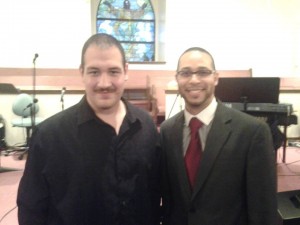
During the August 31 “Does the Christian god exist?” debate within Wilkes-Barre, Pennsylvania’s Mount Zion Baptist Church I participated in alongside Reverend Michael Brewster, I responded to a variation of the moral argument for God’s existence. I would like to address some of his points following the debate. Watch a video of the debate and listen to an audio-only version of the debate to better understand this piece.
Reverend Brewster advanced various problematic assertions in his opening statement and throughout the debate in his attempt to demonstrate the existence of the Christian god: (1) if the laws of morality are not revealed by a transcendent mind, morality is relative, (2) God reveals the laws of morality through reason and logic, (3) without absolute morality we cannot have laws, and (4) God is the source of morality.
As presented, I do not find Reverend Brewster’s argument to be valid (premises properly leading to a conclusion) or sound (having true premises). Before examining the strength of the presented premises, Brewster’s argument begs the question; he assumes what he is trying to demonstrate when he states God reveals morality inside his argument attempting to show God exists.
A reformulation of Brewster’s argument, as follows, may be more helpful:
(1) If the laws of morality are not revealed by a transcendent mind, morality is relative.
(2) Morality is not relative; objective moral values exist.
(3) A transcendent mind exists.
Brewster’s argument, at best, leads to the conclusion that a transcendent mind exists, but through the argument we do not know the characteristics of such a transcendent mind – namely those which constitute the Christian god. In his opening statement, Brewster said that the Christian god is a transcendent, intelligent, infinite, and all-powerful being from which all things move and exist. Also consider the fact that most Christians, including Brewster, although he did not mention this in his opening statement, believe that God sent his only son Jesus to earth in order to die on a cross for a redemption of sins. The moral argument cannot possibly demonstrate all of this.
Before arriving at the conclusion and assuming the argument is sound — having true premises — it’s worth examining the strength of the premises.
Premise one, as I indicated in the debate, poses only two choices when more exist: either morality is relative or objective/absolute. I did not hear support for this premise during the debate other than assertions that humans, when left to their own devices, may disagree with others concerning right and wrong. It was not my responsibility, as I noted several times in the debate, to give an ‘atheist-friendly’ accounting for morality; since Brewster brought the argument forth, he needs to show that his premises are true.
Besides, the history of philosophy and moral thought has contained many approaches to establishing moral truths such as virtue ethics, deontogy, consequentialism, utilitarianism…and divine command theory. Divine command theory — an ethical approach asserting that morality is that revealed by a deity or deities — is one of the most failed ethical approaches in philosophy, yet this is the moral approach Brewster advocates.
Divine command theory faces a serious challenge known as the Euthyphro Dilemma: is that which is moral moral because God commands it or because it is endorsed by God? If morality is established as a result of a divine command, morality is arbitrary because God could command slaughter of innocents and other moral atrocities (as he does in the Bible, as I noted in the debate). If we can know something is moral because it is endorsed by God, there must be some external standard by which something is deemed moral.
Additionally, if we could rule out the Christian god as being a candidate for establishing objective or absolute morality, moral arguments fail to establish that the Christian god exists. I also fail to see how the moral argument leads to the Christian god existing instead of, for instance, an all-evil God who — through establishing that which is evil and good — may exist.
Finally, Reverend Brewster needs to demonstrate that objective moral values exist in order to properly advance his argument. Statements such as ‘we just know what is right and wrong,’ as I heard in the debate is not sufficient.
Reverend Brewster’s moral argument — riddled with multiple problems — fails to establish the existence of the Christian god.
As always, feel free to comment below. Consider watching a video of the debate and listening to an audio-only recording of the debate. Stay tuned for more post-debate thoughts.